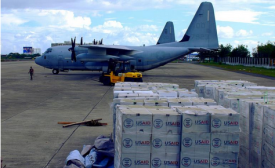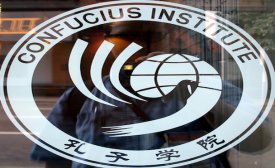china
World attention today is keenly focused on nuclear proliferation in Iran, the future force presence in Afghanistan, and percolating problems between China and Japan involving islands in the East China Sea. And while officials in Washington deliberate how U.S. influence can affect these potentially destabilizing flash points, they're overlooking a country that could be a key contributor toward steadying the ship: India.
On November 8, 2013, Super Typhoon Haiyan ravished the Philippine archipelago. With 195 MPH winds and gusts of up to 230 MPH, the typhoon killed an estimated 4,000 people and displaced another 670,000. Across the southern part of the Philippines and especially in Tacloban, the city most affected by the typhoon, the scene is apocalyptic.
An announcement Tuesday by the obscure-sounding Society for Worldwide Interbank Financial Telecommunication, better known as SWIFT, may not get much ink. China's currency, it reported, was used in 8.66 percent of global trade finance transactions in October, the group said. It's now the No. 2 most widely used currency for trade finance, supplanting the euro.

APDS Blogger: Shannon Haugh
There probably isn't a more American condiment than ketchup. Millions of Americans douse their french fries, hamburgers, hot dogs and other favorite foods with it every day. The ubiquitous tomato-based sauce has been a staple in American cuisine for over a century, with surveys finding that 97% of kitchens in the United States contain a bottle. Given those facts, many Americans may be surprised to learn that ketchup's origins aren't American at all and that tomatoes were introduced to the mix relatively late in the sauce's history.
Confucius Institutes (CIs) are probably China’s most prominent, but also most controversial cultural diplomacy tool. There is a lot of debate going on concerning the political implications of CI’s, especially in the U.S. (the most recent example can be found here) but also elsewhere. While these debates are absolutely necessary and helpful to better understand these institutes, it sometimes seems there is more guessing and speculation rather than a fact based discussion.

Confucius Institutes (CIs) are probably China’s most prominent, but also most controversial cultural diplomacy tool. There is a lot of debate going on concerning the political implications of CI’s, especially in the U.S. (the most recent example can be found here) but also elsewhere.
Shanghai is a city that connotes modernity and rapid economic development. Its inhabitants are known both within and without its confines as upwardly mobile, career-oriented, and financially minded. Tourists come to see bright lights on East Nanjing road and the lavishness of the Bund, both symbols of recent industrialization. What the city lacks, it is commonly believed, is historical and artistic culture.







